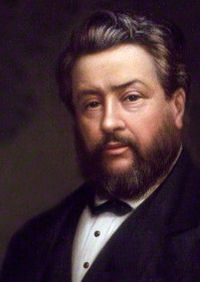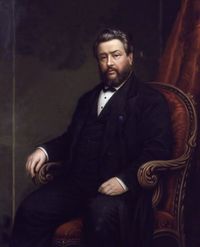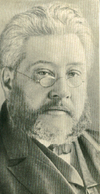| Charles Haddon Spurgeon | |||
|---|---|---|---|
| |||
| Born | 1834 Kelvedon, Essex, England | ||
| Died | 1892 | ||
Charles Haddon Spurgeon (1834-1892) is considered to be one of the greatest preachers of all time. He was a pastor at the Metropolitan Tabernacle in London and gained fame for his direct and powerful preaching style. His church grew to more than 6,000 members and by 1861 he was being called the "Prince of Preachers".
During his time as pastor of the Metropolitan Tabernacle, Spurgeon was an outspoken opponent of Socialist doctrines.
Contents
Early life[edit]
He was born in 1834 in Kelvedon, Essex of Dutch parents. Spurgeon was converted in a Methodist chapel, but became a member of a Baptist church in 1850. An eloquent speaker and a hard worker, he grew into a young preacher. His first sermon was at the age of sixteen, and he pastored a church in Waterbeach, Cambridgeshire by the age of only twenty.
Pastor[edit]
The Spirit of God worked strongly through him; his congregation grew till the building could no longer accommodate them all. His oratorical gifts no doubt helped, but it was the truth of the Gospel that gave his words real power. The church had gone from empty to packed within months. People of every class and type gathered to hear him speak.
On 19 October 1856 a malicious alarm of fire raised while Spurgeon was preaching at the Surrey Gardens music-hall. This led to a panic which caused the death of seven persons and the injury of many others, but Spurgeon's reputation was not endangered. At twenty-two Spurgeon was the most popular preacher of his time.[1]
On January 8, 1856, he married Susannah Thompson.[2] They had twin boys, Thomas and Charles, on September 20, 1856.
Newington Causeway[edit]
In 1861, a new church was built for Spurgeon that would hold 6000 people. This was a great blessing to an independent pastor who was not in any denominational organization. He preached there, at the Metropolitan Tabernacle until his death in 1892. Spurgeon affected his area like no one else could. His church was a hub of ministries: a pastor's college was founded(known today as Spurgeon's College), an orphanage founded, and also a colportage association for the propagation of uplifting literature. Ultimately, Charles Spurgeon accomplished the goal of the pastor: to affect the local community in a tangible and positive way, to see souls saved and people following the footsteps of Jesus.
Convictions[edit]
Calvinism[edit]
Spurgeon was a staunch Calvinist, and an outspoken opponent of Catholicism.[3] A far cry from the ecumenicals of today, he would not back down from his beliefs even at the expense of losing friends. "Suppose ye that I am come to give peace on earth? I tell you, Nay; but rather division: For from henceforth there shall be five in one house divided, three against two, and two against three." (Luke 12:52-53)
He keenly resented what he called the 'down grade' developments of modern biblical criticism, and the conviction grew on him that faith was decaying in all Christian churches. Consequently, on 26 Oct. 1887 he announced his withdrawal from the Baptist Union, the central association of Baptist ministers, which declined to adopt the serious view that he took of the situation.[1]
Quotes[edit]
See Also: Spurgeon's dictum
- "If Christ be anything, He must be everything"[4]
- "Of two evils, choose neither."
- "When asked what he thought should be done when lay people fell asleep in church, he replied, "Someone should wake up the preacher."
- "Wisdom is the right use of knowledge. To know is not to be wise. Many men know a great deal, and are all the greater fools for it. There is no fool so great a fool as a knowing fool. But to know how to use knowledge is to have wisdom."
- "Atheism is a strange thing. Even the devils never fell into that vice"[5]
- "I believe that one reason why the Church of God at this present moment has so little influence over the world is because the world has so much influence over the Church."[6]
- "Nothing teaches us about the preciousness of the Creator as much as when we learn the emptiness of everything else"
Spurgeon on Socialism[edit]
- "I would not have you exchange the gold of individual Christianity for the base metal of Christian Socialism."[7][8] - One Lost Sheep, April 28, 1889
- "Some of us may have passed away, but you who are younger may live to see modern thought obtain supremacy over human minds: German rationalism which has ripened into Socialism may yet pollute the mass of mankind and lead them to overturn the foundations of society." - The Headstone of the Corner, June 23, 1878
- "The next thing, dear friends, is that we must prove that the old faith produces much love of our fellow men. You know that, nowadays, the watchword is, "the enthusiasm of humanity." It is a curious thing that those churches that have such a wonderful "enthusiasm of humanity" speak of us as if we were always talking of God and forgetting men. Well, well, which of these new-fangled churches has an orphanage? It is very fine to talk about Christian socialism and what you are going to do for the poor - but what have you done? Much of it is just chatter, chatter and nothing else! But the godly, who feel that God is all, are, after all, those who care most for men. And those who believe most firmly that the unbelieving sinner will be lost are the men who are most anxious to have him saved!" - Dare to Be a Daniel, January 15, 1893[9]
- "The god of modern thought exceedingly resembles the deities described in this psalm.[10] Pantheism is wondrously akin to Polytheism, and yet differs very little from Atheism. The god manufactured by our great thinkers is a mere abstraction: he has no eternal purposes, he does not interpose on the behalf of his people, he cares but very little as to how much man sins, for he has given to the initiated "a larger hope" by which the most incorrigible are to be restored. He is what the last set of critics chooses to make him, he has said what they choose to say, and lie will do what they please to prescribe. Let this creed and its devotees alone, and they will work out their own refutation, for as now their god is fashioned like themselves, they will by degrees fashion themselves like their god; and when the principles of justice, law, and order shall have all been effectually sapped we may possibly witness in some form of socialism, similar to that which is so sadly spreading in Germany, a repetition of the evils which have in former ages befallen nations which have refused the living God, and set up gods of their own." - The Treasury of David, p. 267.[11]
- "The fall of Adam is treated as a fable. And original sin and imputed righteousness are both denounced. As for the Doctrines of Grace - they are ridiculed as altogether out of vogue and even the solemn sanctions of the Law are scorned as bugbears of the dark ages. For many a year, by the grand old Truths of the Gospel, sinners were converted and saints were edified and the world was made to know that there is a God in Israel. But these are too antiquated for the present cultured race of superior beings! They are going to regenerate the world by Democratic Socialism and set up a kingdom for Christ without the new birth or the pardon of sin. Truly the Lord has not taken away the seven thousand that have not bowed the knee to Baal but they are, in most cases, hidden away - even as Obadiah hid the Prophets in a cave." - A Dirge for the Down-grade and a Song For Faith, April 18, 1889[12]
- "Whatever there may lack of grace and beauty in our speech, and our outward appearance, may there be no lack of Jesus Christ, set forth among the sons of men; for "men shall be blessed in him," and not without him. Great schemes of socialism have been tried and found wanting; let us look to regeneration by the Son of God, and we shall not look in vain. Nothing has come of newfangled preaching, from the first day till now; but never has the old faith of Jesus failed. Men have been blessed in Jesus, and they shall be blessed in him as long as the race shall exist." - Jesus "All Blessing and All Blest", February 1st, 1891[13]
- "Knock at no door which thou wouldst not have opened.
- Or it may open on a sudden, and thou wilt stand confounded. When persons speak for a cause which they do not really believe in,
- they may have to pay dearly for their words. Some who defend Socialism may soon have too much of it." - Proverbs and Quaint Sayings[14]
Works[edit]
- According to Promise: God's Promises to Every Christian
- All of Grace
- All Round Ministry
- Chequebook of the Bank of Faith
- Come Ye Children
- John Ploughman's Talks
- Lectures to My Students
- Morning and Evening: Daily Readings
- The Saint And His Savior
- The Salt-cellars: Being a Collection of Proverbs, Together with Homely Notes Theron
- The Soul Winner: Or How to Lead Sinners to the Saviour
- The Sword and the Trowel
- The Treasury of David
Sermons[edit]
Sources[edit]
- Biography at wholesomewords.org
- What Hath God Wrought! Dr. William P. Grady, Grady Publications inc. (c.) 1996
- Streams of Civilization vol.2 Garry J. Moes, 1995
- Biography at spartacus.schoolnet.co.uk
- Biography at Christian Classics Ethereal Library
References[edit]
- ↑ 1.0 1.1 Biography wholesomewords.org. 6 May 2008
- ↑ Spurgeon: Prince of Preachers
- ↑ Charles Spurgeon QUOTES on ROMAN CATHOLICISM
- ↑ Devotional Classics of C. H. Spurgeon
- ↑ Spurgeon at His Best: Over 2200 Striking Quotations from the World's Most Exhaustive and Widely-read Sermon Series
- ↑ The Soul-winner: Or How to Lead Sinners to the Saviour
- ↑ (2015) The Complete Works of C. H. Spurgeon, Volume 35: Sermons 2062-2120, 309–310.
- ↑ (1886) The Metropolitan Tabernacle Pulpit: Sermons, Parts 405-416.
- ↑ Dare to Be a Daniel
- ↑ Psalm 115:8
- ↑ The Treasury of David: Containing an Original Exposition of the Book of Psalms, by C. H. Spurgeon, 1882
- ↑ A Dirge for the Down-grade and a Song For Faith
- ↑ Jesus "All Blessing and All Blest"
- ↑ The Salt-cellars: Being a Collection of Proverbs, Together with Homely Notes Thereon, Volume 1
External links[edit]
- Works by Charles H. Spurgeon - text and free audio - LibriVox
- Commenting and Commentaries, The Spurgeon Archive
- The Spurgeon Library, maintained by Midwestern Baptist Theological Seminary, one of six seminaries operated by the Southern Baptist Convention


